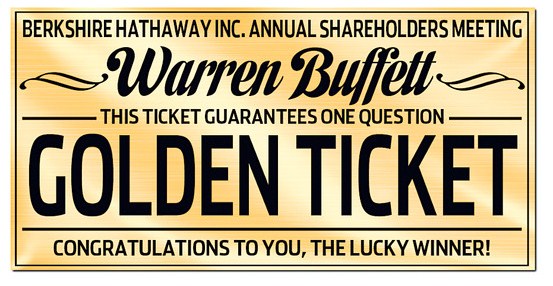|
For previous reports of Berkshire Hathaway shareholder communication practices supporting its widely observed annual meetings, see |
Wall Street Journal, December 29, 2011 article
By SERENA NG Among investors, there are few prizes more coveted than the opportunity to ask Warren Buffett a question at Berkshire Hathaway's annual shareholders meeting. But this year, Fidelity Investments mysteriously claimed more than its fair share. Turns out, it was no accident—and the Oracle of Omaha is none too pleased about being outfoxed on his own turf. Now he is turning the tables.
"There's no question they figured out how to game the system," Mr. Buffett says. He said he didn't like Fidelity's ploy because "it's not in the spirit of the meeting." Mr. Buffett says he is still formulating his countermove and is likely to detail a new questioning system before the next meeting on May 5. For years, thousands of people have flocked to Omaha, Neb., to attend the annual meeting of Berkshire Hathaway Inc. It is one of the few occasions where investors can hear directly from Mr. Buffett, Berkshire's chairman and chief executive, who shuns conference calls and private meetings with individual shareholders or analysts. Attendance has been above 30,000 in recent years at the so-called Woodstock for Capitalists, with many aspiring to ask one of the 50 or more audience questions allowed each year. Three years ago, Mr. Buffett tried to put an end to footraces to the microphones that at times became scrums. He set rules to pick questioners at random, through drawings held next to 13 microphones in different parts of the auditorium. Shareholders could alternatively send questions to a panel of journalists that would alternate with the crowd in asking them. Fidelity, one of Berkshire's largest outside shareholders, typically sends a large contingent to the event. The trip is viewed within the firm as a learning experience for younger analysts and even experienced managers who want to glean investing insights, according to people familiar with the matter. Over the years, some Fidelity employees grew frustrated by the quality of questioning, which often drifted to Mr. Buffett's personal habits, recommended reading, and his advice for students. Others were exasperated by fruitless sprints to auditorium microphones in the old system. "It was a strain on the legs, and a lot of wasted effort," recalls a Fidelity portfolio manager who previously took part in the event. After the raffle system was introduced, a group of Fidelity analysts and money managers began plotting ways to get more face-time with Mr. Buffett. In 2010, they tried to increase their chances of being picked by having multiple people take part in a small number of raffles. That effort was only moderately successful, so they began plotting what was known internally as the "enhanced version" of the strategy, according to people familiar with the matter. This year, more than 40 Fidelity representatives went to the meeting, fanning out and entering raffles held all over the auditorium. Roughly 500 to 800 people entered the drawings, according to the company. It wasn't rocket science, but Fidelity's plan worked: Representatives from the Boston-based firm got to ask six out of 27 questions allocated to the crowd, or more than one out of five questions. Following the custom of past meetings, those that took the microphone identified themselves by their name and hometown, without mentioning their employer. Two more questions were asked on the firm's behalf by the journalists, getting Fidelity a total of eight out of 54 questions. Mr. Buffett didn't learn that Fidelity was so prominently featured until later, and termed it "an unusually high hit rate." A Fidelity spokeswoman declined to comment on Berkshire and Mr. Buffett, but said the objective of Fidelity's investment staff when meeting any company is to "ask the right questions so they can obtain the best information to analyze and evaluate that company." Fidelity holds about $4 billion of Berkshire shares, or a roughly 2% stake in the company. At the April meeting, Fidelity representatives asked Mr. Buffett and his business partner Charlie Munger about the outlook for banks Berkshire had stakes in and how they estimate a company's growth. Joel Tillinghast, a longtime Fidelity stock fund manager who is writing a book about investing, asked how they think about companies' returns on capital. Other regular pilgrims to Omaha say the meeting's dirty little secret is that, with a little planning, it is not that hard to get microphone time. Whitney Tilson and Glenn Tongue, managing partners of New York investment firm T2 Partners LLC, both asked questions this year after taking part in a drawing held in an "overflow room," a ballroom with a video link that accommodates hundreds of attendees who arrive late or can't find seats in the main auditorium. Mr. Tilson, who has also asked questions in previous years, says he noticed some time back that few people in the overflow room signed up for the opportunity. He says he has long watched the meeting from that location simply "because it's less chaotic and more comfortable." ("He figured out the weak link," observes Mr. Buffett.) For next year's meeting, Mr. Buffett has so far decided the crowd will get roughly a third fewer questions because a panel of Wall Street analysts will be added to the lineup. He also says Berkshire will "take steps to make sure that the questions from the audience are really by chance." Whatever system Mr. Buffett comes up with, some Fidelity insiders say they will look for a way around it—within the rules, of course. Mr. Buffett says he doesn't fault them for trying. "I might have done the same thing when I was that age," he says. Write to Serena Ng at serena.ng@wsj.com
|
